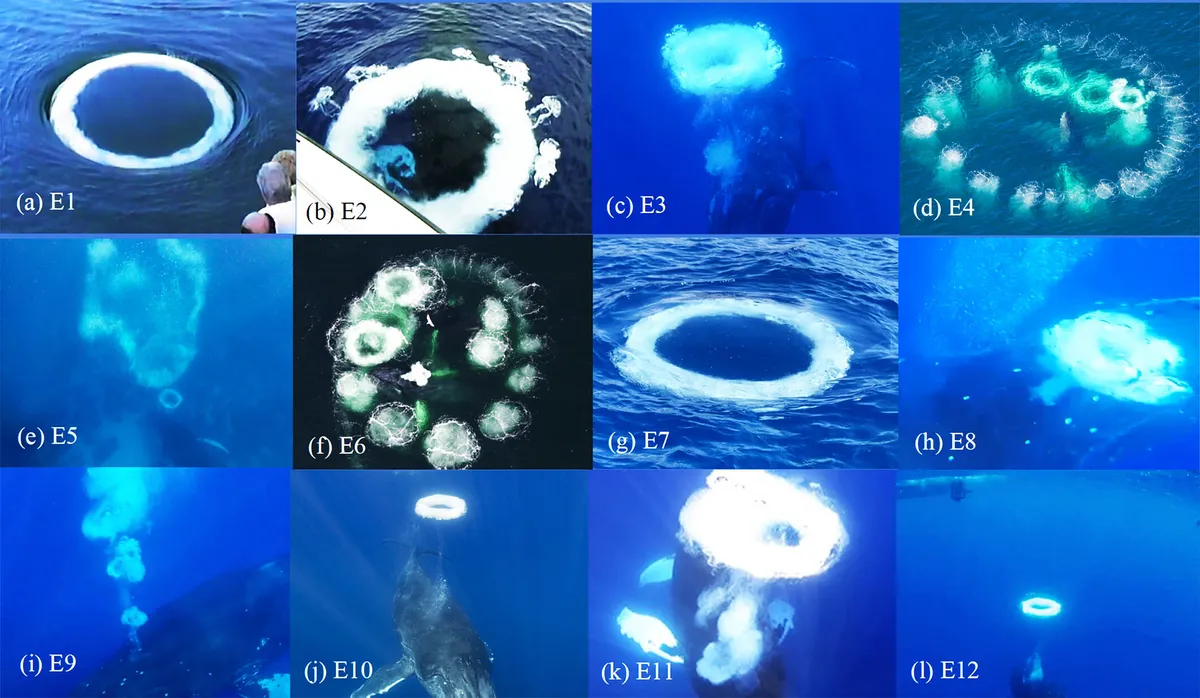
Whales, particularly humpback whales, are renowned for their intelligence and complex social behaviors. These magnificent creatures exhibit remarkable traits such as using intricate sounds, traveling in social groups, and demonstrating strong memory capabilities. But what occurs when these intelligent beings engage in activities that extend beyond mere feeding or mating? Recent research has revealed that humpback whales may interact in a creative and playful manner by producing bubble rings.
For the first time, a collaborative team from the SETI Institute and the University of California at Davis (UC Davis) has documented humpback whales creating bubble rings during friendly encounters with humans. Unlike the bubble nets used for hunting, these bubble rings resemble spinning smoke donuts that rise gracefully from the ocean’s depths. This study offers a rare glimpse into nonhuman creativity, suggesting that the act of creating bubble rings may serve purposes such as play, communication, or curiosity.
The researchers from WhaleSETI successfully recorded 39 instances of bubble ring production from 11 whales across 12 different encounters. These observations took place in various locations, including Hawai’i, the Dominican Republic, Mo’orea, and off the U.S. Atlantic coast. A notable finding was that at least one whale was observed using only one nostril to create a ring, a detail uncovered through meticulous frame-by-frame analysis that implies a level of fine motor control uncommon in such large mammals.
Dr. Laurance Doyle, a scientist at the SETI Institute and co-author of the study, highlights the implications of this behavior. “Due to current limitations on technology, we assume that extraterrestrial intelligence would be interested in making contact with humans,” he explains. “This assumption is supported by the independent evolution of curious behavior in humpback whales.” Importantly, bubble rings were produced in relaxed conditions, absent of prey or aggression, indicating that these interactions were not purely instinctual but rather intentional and playful.
During nine of the documented episodes, labeled as inquisitive, whales showed a preference for engaging with nearby humans or vessels over other whales. In fact, seven out of eight whales that created bubble rings swam within one body length of boats or swimmers. In a memorable encounter, a whale’s bubble ring partially encircled a swimmer at the surface, showcasing their playful nature.
Dr. Fred Sharpe, co-lead author of the study, states, “Humpback whales live in complex societies, are acoustically diverse, and utilize bubble tools.” The research suggests that the act of blowing bubble rings might be an attempt to engage in play, observe reactions, or communicate with humans. While bubble rings have previously been documented in dolphins and beluga whales, this study marks the first well-documented instance in baleen whales. The absence of bubble rings during earlier drone surveys, when humans were not present, implies that humpback whales may direct these displays specifically toward us.
Among the observed behaviors accompanying bubble ring production were slow movements, head lifts, and spy-hopping, which support the notion that this behavior is not incidental. In one instance, a whale interacted with seaweed before producing a ring, further suggesting a playful intent. “Humpback whales often exhibit friendly behavior towards boats and human swimmers,” notes co-lead author Jodi Frediani. “We’ve identified a dozen whales from various populations around the world that have voluntarily approached humans while blowing bubble rings.”
The study emphasizes the significance of whale bubble rings as a potential form of communication or playful interaction. Observations revealed that the whales displayed no signs of fear or aggression during these encounters; many lingered after producing bubble rings, possibly to watch human reactions. One whale even created 11 rings in a single encounter, suggesting a deliberate repetition of this behavior.
Patterns of bubble production—whether rings, plumes, or bursts—may indicate different social cues or intentions among whales. The researchers encourage whale watchers, swimmers, and boaters to report any sightings of bubble rings, including details such as location and behavior, to help create a more comprehensive understanding of whale behavior and their attempts at interspecies connection.
As recognized by renowned animal trainer Karen Pryor, patterns of bubble production in cetaceans represent a unique mode of communication not found in terrestrial mammals. If humpback whales are indeed attempting to communicate with humans through bubble rings, even playfully, it is essential that we remain attentive. The findings of this study have been published in the journal Marine Mammal Science, underscoring the importance of understanding and preserving the complex behaviors of these incredible marine mammals.
—– Like what you read? Subscribe to our newsletter for engaging articles, exclusive content, and the latest updates. Check us out on EarthSnap, a free app brought to you by Eric Ralls and Earth.com. —–